18 Nov 2013 | Egypt, News, Politics and Society, Religion and Culture
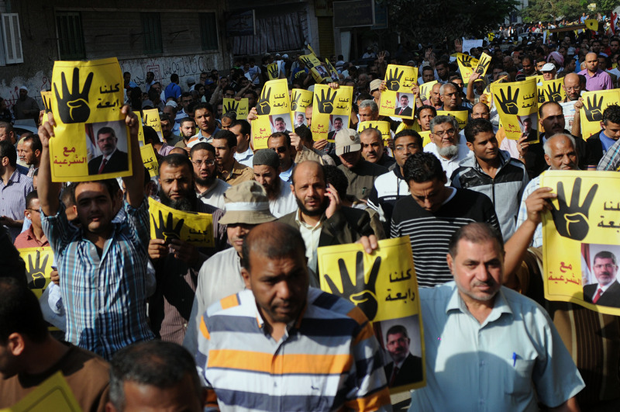
Supporters of Egypt’s ousted President Mohammed Morsi in Helwan District raise his poster and their hands with four raised fingers, which has become a symbol of the Rabaah al-Adawiya mosque. (Nameer Galal / Demotix)
Public service messages on Egyptian radio stations candidly tell listeners that a new constitution currently being drafted by a fifty-member panel “won’t be the best that the country has had”. Listeners are assured however, that the new charter will not be Egypt’s last.
“Regardless of whether you approve or disapprove of the new charter, you must vote in the popular referendum on the document,”exhorts the radio ad. “This will send a message to the world that Egyptians are united.”
The radio spots serve as a warning to the public against raising their expectations too high for the new constitution which –if endorsed in a national referendum slated for January 2014–will replace the country’s first post-revolution constitution drafted under Muslim Brotherhood rule. The 2012 constitution’ crafted by an Islamist-dominated panel was suspended on July 3 — the day Islamist President Mohamed Morsi was toppled by military-backed mass protests. Critics blame the “divisive, Islamist-tinged constitution” for Morsi’s political isolation while he was still in office and say that it ultimately led to his downfall. The 2012 charter– and a decree issued by the now-deposed president giving himself extra-judicial powers –sparked violent protests outside the presidential palace last December in which around a dozen people were killed. The toppled president is now facing trial for allegedly inciting the killing of protesters during what has since come to be known as the “Ittihadeya violence”.
A fifty-member constituent assembly made up mostly of leftists and liberal politicians, who were hand picked by the interim government, is currently working on amending the 2012 disputed charter. The assembly has been given a sixty day mandate, which expires on December 3, to complete the seemingly Herculean task. Democracy advocates had hoped the revised document would be a vast improvement to the one liberals had complained “strengthened the role of Islamic law, gave the military extensive powers and undermined the rights of minorities and women.” But as the deadline draws near for submitting the draft document to interim president Adly Mansour, rights campaigners say their hopes for a more liberal constitution that meets the aspirations of Egypt’s revolutionaries have been all but dashed . They complain that “the draft charter grants the military even greater powers and preserves the Islamic law provisions while also falling short of protecting the rights of women and workers .”
Revolutionary activists are particularly enraged by a provision that would grant the military the power to try civilians in secret military courts. Senior army officials have defended the clause saying it is “necessary in light of the surge in Islamist militant attacks against security and military forces in the Sinai and elsewhere in the country since Morsi’s ouster.” Rights advocates meanwhile argue that such trials are “hasty and are known to deliver disproportionately harsh sentences.” Hassiba Sahraoui , Amnesty International’s Deputy Director for the Middle East and North Africa has denounced Egyptian military tribunals as being “notoriously unfair.” Egyptian journalist Ahmed Abu Draa , the Sinai correspondent for the independent Al Masry El Yom Newspaper was detained by the military last September and faced a military tribunal on charges of “spreading false news about the military”. In a statement calling for his release, Sahraoui reminded Egyptian authorities that “trying civilians in military courts flouts international standards.” She also denounced the decision to try Abu Draa in a military court as “a serious blow to press freedom and human rights in Egypt.” While Abu Draa was handed a six month suspended jail sentence in October,anyone who challenges or “insults the military” risks suffering a similar fate.
While the previous constitution had given the military the discretion to indict civilians for “crimes that harm the armed forces,” the revised document allows the army to indict anyone “for crimes in which officers are involved.” The “No To Military Trials For Civilians group”–a grassroots movement working to end the practice, has in recent days threatened to reject the draft charter if the provision remains unchanged.
“It is clear that the military wants to maintain its privileges including the broad discretion to punish and try people as they choose,” Heba Morayef, Human Rights Watch Egypt Director, told the Washington Post earlier this month.
A brutal security crackdown on members and supporters of the Muslim Brotherhood — including the detention of more than 2000 members of the Islamist group, ill-treatment of political detainees and the killing of around 1000 people since Morsi’s ouster– signals continued impunity for the military and the police in Egypt, Morayef lamented.
Role of Islam
Religion has always played an important role in Egypt’s conservative, patriarchal society. Prior to the January 2011 uprising, Egypt could neither be described as a “religious” state nor as a “secular” state (in the Western sense of the word). While the country was not ruled by “religious authority, practically every aspect of Egyptian life was governed by religion. Under Muslim Brotherhood rule, Egypt’s liberals and Christians had feared the country was headed on the path of even greater Islamisation. Morsi’s ouster, however, revived the hopes of some of the revolutionary and liberal groups for the creation of the “secular, civil state” that revolutionary activists had called for during the 2011 mass uprising that toppled former President Hosni Mubarak. It is now almost certain that those groups are headed for disappointment.
Right from the start of the constitution amendment process, it became clear that Article 2 would remain unchallenged. The article –adopted from the two previous constitutions– states that “the principles of Islamic Law (Sharia) are the principle source of legislation in the country” and that “Islam is the religion of the state.” Another provision meanwhile, stipulates that Egyptian Christians and Jews should refer to their own religious laws on personal status issues. Unlike those two provisions which are supported by a majority of the assembly members, Article 219 –which defines Islamic Law based on Sunni Muslim jurisprudence — has been a bone of contention, sparking heated debate among the members. The three Christian members on the panel this week threatened to walk out if the controversial article was not removed. They fear the provision which allows for stricter interpretations of Islam could undermine the rights of Egypt’s minority non-Muslim population (including Christians who make up an estimated 10 to 12 percent of the population). Bassam al-Zarqa, the sole Salafi member on the panel insists however that the provision should remain in the new charter.
Since the military takeover of the country a little over four months ago, Egypt has witnessed a surge in church attacks while hundreds of Christians have been forced to flee their homes in search of less hostile environments.
While the panel has voted separately on each of the amended articles, it has postponed discussions on the contentious issues until the end of the month to allow tensions to ease. It remains to be seen however, whether the wide gap in the members’ perceptions of the role of Islam in the “new Egypt” can be bridged .
Women’s Rights
Rights advocates have also expressed concern that the draft charter may not match expectations for greater rights for women. Calls by women’s rights groups for restoration of a quota system that would ensure fair representation of women and Christians in parliament have so far fallen on deaf ears. Last Wednesday, dozens of activists staged a protest rally outside the Shura Council headquarters in Cairo demanding the re-introduction of the women’s quota without which they fear women will be grossly under-represented in the next parliament.
“The panel has announced it would retain the obligatory 50 percent parliamentary representation of workers and peasants from earlier constitutions, why then doesn’t it re-introduce the quota system so that women too can guarantee a fairer representation in the People’s Assembly?” asked Mona Qorashy, a feminist who participated in Wednesday’s rally.
Low female representation in parliament and a surge in sexual violence against women have pushed Egypt to the bottom of the Arab region for women’s rights. A recent poll by the Thomson Reuters Foundation on the treatment of women in 22 Arab countries has labelled Egypt “the worst Arab country for women” below Saudi Arabia and Iraq — two countries known to have an exceptionally poor human rights record.
Workers’ Rights
Workers too are unhappy about their rights in the draft constitution. In comments to the semi-official Al Ahram newspaper, Kamal Abbas, a rights activist and Coordinator of the Centre for Trade Union and Workers Services described the draft document as “labour-unfriendly.” He cites Article 14 as one of the reasons for his conviction. “The article states that ‘peaceful industrial actions like strikes and sit-ins are inherent labour rights’ but then goes on to empower legislators to regulate such action,” he complained.
Representatives of the newly formed trade unions are absent from the constituent committee, he lamented, adding that “the sole labour representative on the panel is a member of the government-controlled Egyptian Trade Union Federation–an ardent opponent of the ongoing labour strikes.”
As panel members race against time to meet the December 3 deadline for submitting the draft document to the President , public debates on the document are taking place in parallel outside the confines of the Shura Council premises. Egyptians who have become increasingly politicized since the 2011 uprising, are adamant to take part in the discussions that will shape their future for years to come. “We cannot afford to wait for the referendum to express our views on the constitution. Now is the time to pile pressure on the politicians. After all, it is our destiny –and that of our children– which is at stake,” said Somaya Saeed, a veiled housewife who was at the women’s protest last Wednesday. She pointed to a placard raised by another protester and read the words out loud: “Women are capable of effecting change. Where are the women in the new constitution?” With only five women on the constituent panel, it is not surprising that the rights of women are being overlooked.
This article was originally published on 18 Nov 2013 at indexoncensorship.org
7 Nov 2013 | Africa, News
1) Angola
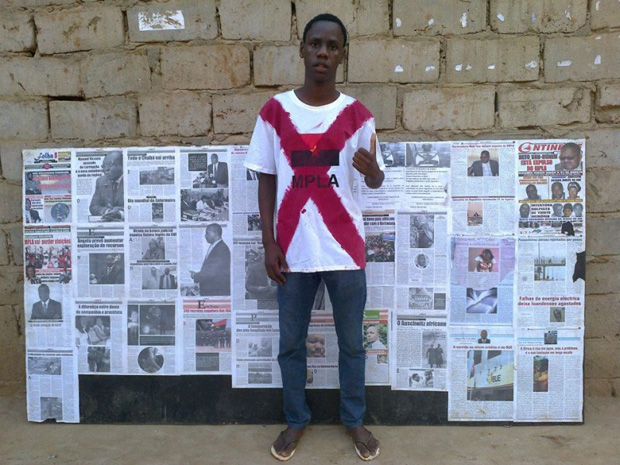
Manuel Chivonde Nito Alves was held in solitary confinement for printing t-shirts. Image from his Facebook page.
Angolan 17-year-old Manuel Chivonde Nito Alves went on hunger strike on Tuesday, following his arrest on 12 September for printing t-shirts with the slogan “Out Disgusting Dictator”. The message was aimed at the country’s President Jose Eduardo dos Santos, who has held power in since 1979. The shirts were to be worn at a demonstration in the capital Luanda, highlighting corruption, forced evictions, police violence and lack of social justice under dos Santos’ regime. Nito Alves has been charged with “insulting the president”, and has now spent almost two months in detention – parts of it in solitary confinement. His family were barred from seeing him, and three weeks went by before he was allowed to speak to a lawyer. The hunger strike is in protest at his “unjust and inhumane treatment”.
2) Belarus
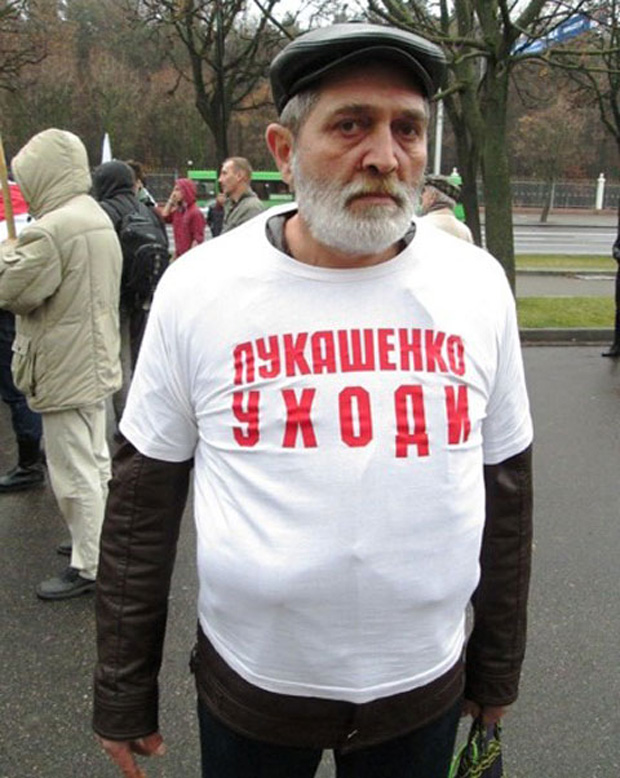
Yury Rubstow wearing the t-shirt that landed him in prison. (Image Viasna Human
Rights Centre)
On Monday, Belarusian opposition activist Yury Rubstow was sentenced to three days in jail for wearing a t-shirt with the slogan “Lukashenko, go away” on the front, and “A four-time president? No. This is not a president but an impostor tsar” on the back.” The message was aimed at the country’s dictator Alexander Lukashenko, during an opposition protest march. He was found guilty of disobedience to police officers under Article 23.4 of the Civil Offenses Code.
3) Swaziland
In 2010, Sipho Jele, a member of Swaziland’s People’s United Democratic Movement, was arrested for wearing a t-shirt supporting the party during a May Day parade. He was arrested under the country’s Suppression of Terrorism Act, and died in custody. The police said he had hanged himself, while the party say the police of killed him.
4) Egypt
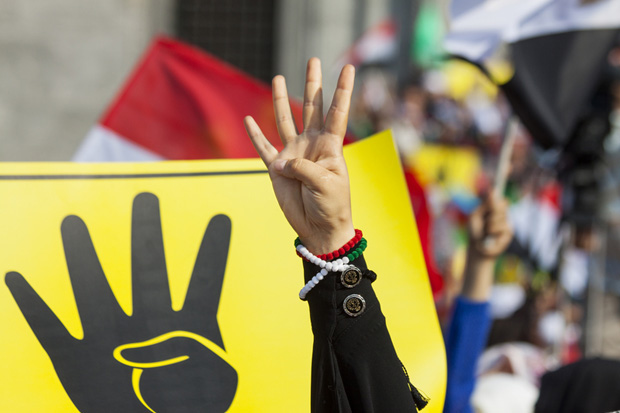
The Rabaa symbol displayed at a protest in Turkey (Image Bünyamin Salman/Demotix)
In September, three Egyptian men were arrested for wearing t-shirts emblazoned with the Rabaa symbol. A hand holding up four fingers, it is widely used by those opposing Egypt’s interim military-backed government, and the coup that ushered in in. Mohamed Youssef, the country’s kung fu champion, was also suspended by the national federation for wearing a similar t-shirt during a medal ceremony.
5) Hong Kong
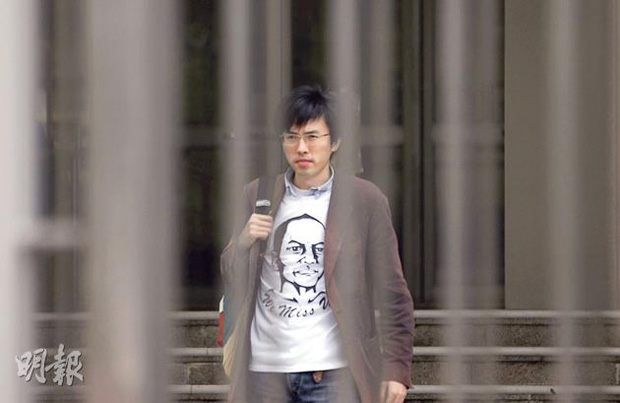
Avery Ng wearing the t-shirt he threw at Hu Jintao. Image from his Facebook page.
An activist from Hong Kong was arrested last December for throwing a t-shirt at former Chinese president Hu Jintao during an official visit almost six month earlier, on 1 July. League of Social Democrats Vice Chairman Avery Ng threw a t-shirt with a drawing of the late Chinese dissident Li Wangyang, a Tiananmen Square activist who died under suspicious circumstances only weeks before the visit. Ng was charged “with nuisance crimes committed in a public place”.
6) Malaysia
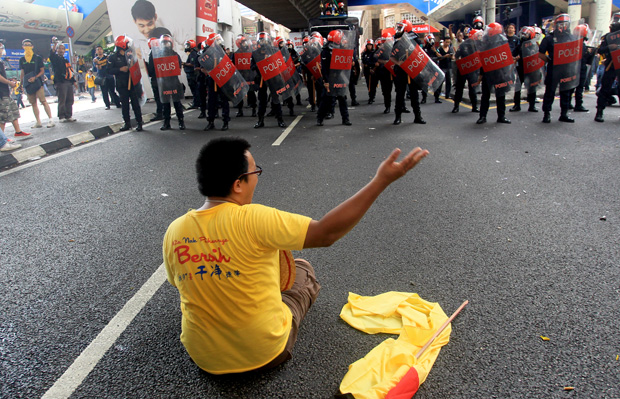
Malaysian protester wearing a Bersih shirt. (Image Syahrin Abdul Aziz/Demotix)
In June 2011, Malaysian police arrested 14 opposition activists for wearing t-shirts promoting a rally in Kuala Lumpur calling for election reform. The shirts carried the slogan “bersih” which means “clean”, and is the name of one of the groups behind the protest. Authorities claimed the demonstration was an “attempt to create chaos on the streets and undermine the government”, and they were therefore within their rights to arrest the protesters. They also confiscated t-shirts from the group’s headquarters.
7 & 8) The US

Jared Marcum wearing his NRA t-shirt in a TV report. (Image Youtube)
A 14-year-old student from West Virginia was in April suspended from school and subsequently arrested for refusing to remove a t-shirt supporting the pro-gun National Rifle Association. Jared Marcum was charged with “obstructing an officer” and faced a $500 fine and up to one year in prison.
On the flip side, a Tennessee man was arrested for wearing a t-shirt in support of stricter gun control laws. Stanley Bryce Myszka was wearing a shirt that read “Has your gun killed a kindergartener today?” at a shopping centre, following the shooting at Sandy Hook Elementary School. He was approached by security guards, who called the police when he when he refused to remove the shirt. He was also banned from the shopping centre for life.
9) United Kingdom

The front of Barry Thew’s t-shirt. (Image Greater Manchester Police)
A Manchester man was in October 2012 sentenced to eight months in prison in part for wearing a t-shirt emblazoned with offensive comments referencing the murders of two policewomen. Barry Thew had written “One less pig; perfect justice” on the front of his t-shirt and “killacopforfun.com haha” on the back. While four months of the sentence was handed down for breach of a previous suspended sentence, he was charged on a Section 4A Public Order Offence for the t-shirt incident.
30 Oct 2013 | Egypt, News, Religion and Culture
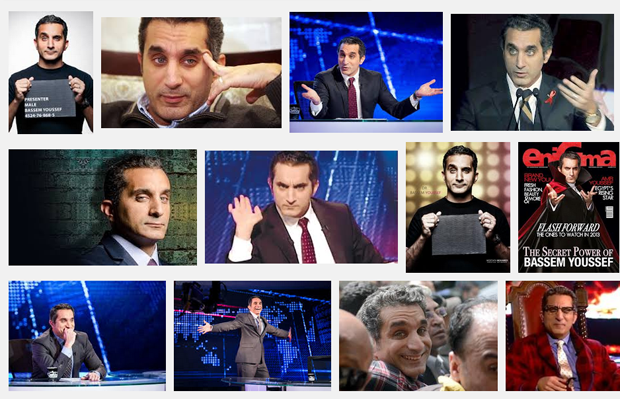
After months away from the small screen, TV satirist Bassem Youssef is back on the air but it is uncertain how long he’ll stay. After a four month absence (Youssef’s disappearance coincided with the overthrow of Egypt’s first democratically-elected President by a military coup) he returned to the airwaves last Friday with a new episode of his weekly TV show Al Bernameg (The Programme). The episode sparked a new wave of controversy, reflecting the deepening divisions in Egyptian society.
Just 48 hours after the show was broadcast, the Public Prosecutor ordered an investigation into a legal complaint against Youssef, one of several filed by citizens angered by his mockery of the military chief. Others were upset by jibes he made at the former ruling Islamists. Youssef has been accused of “inciting chaos, insulting the military and being a threat to national security.”
Youssef is no stranger to controversy. He caused a stir when he mocked the now deposed Islamist President Mohamed Morsi on his show, broadcast on the independent channel CBC. At the time, several lawsuits were filed against him by conservative Islamist lawyers who accused him of “insulting Islam and the President” and Youssef consequently faced a probe by the Public Prosecutor. The charges against him were dropped several months later however. President Morsi was careful to distance himself from the legal complaints filed against Youssef, insisting that he “recognised the right to freedom of speech.” While the lawsuits did little to harm Youssef (in fact, they actually contributed to boosting his popularity and improving the ratings of the show), they did damage the image of the ousted President, who was harshly criticised for “intimidating and muzzling the press.” A couple of months before his removal from office, Morsi was accused by critics of “following in the footsteps of authoritarian Hosni Mubarak and of using repressive tactics to silence dissent.”
Now, under the new military-backed interim government, Youssef finds himself in hot water again. This time the TV comedian, known as Egypt’s Jon Stewart, is in trouble for poking fun at leaked comments by the Defence Minister, General Abdel Fattah al-Sisi, suggesting that the General would “find partners in the local media willing to collaborate to polish the image of the military.” In recent months, Youssef has maintained an objective and neutral position vis a vis the events unfolding in Egypt. In his articles published in the privately-owned Al Shorouk daily, he has expressed concern over the brutal security crackdown to disperse two pro-Morsi sit ins in Cairo on August 14, in which hundreds of Muslim Brotherhood supporters died. But he has also been careful to criticise the attacks on churches (often blamed on Islamists) following the coup.
Friday’s episode, which marked the start of a new season for the show, focused in part on the blind idolisation of al-Sisi by many Egyptians since the coup. The word coup was never once mentioned on the programme. In one scene, Youssef is seen putting his hand over the mouth of one of his assistants in an attempt to silence him as he utters the now-taboo word. In recent weeks, calls have grown louder for the General to run in the country’s next presidential election and a group of adoring fans has even begun collecting signatures for his candidacy.
The fact that Youssef is being prosecuted again after what many Egyptians consider was a “second revolution” signals that the June 30 revolt that ousted the Islamist President has failed to usher in a new era of greater press freedom .The lawsuits serve as a chilling reminder of the dangerous polarisation in the country, which some analysts warn may push it into civil war and chaos. While Youssef did take part in the June 30 protests that toppled Morsi, he has clearly decided not to take sides in this hostile environment. In an article published days before the show, he noted that many Egyptians advocate for free speech and democracy “as long as it is in their favor” but turn against you the minute your opinions differ from theirs. Aware that his episode had ruffled feathers, he sought to ease tensions with a message on Twitter that reminded his viewers, fans and critics alike, that at the end of the day, this is just “another episode in a TV show.”
This article was originally posted on 30 Oct 2013 at indexoncensorship.org
28 Oct 2013 | Egypt, News

An image from Ghada Wali’s Film Ikhwany
A London gallery has found itself in a censorship dispute, after deciding not to exhibit 12 prints satirising Egypt’s Muslim Brotherhood and jailed former president Mohamed Morsi.
In The City, an exhibition dealing with the four Arab cities of Alexandria, Algiers, Baghdad and Nablus, is currently taking place at the P21 Gallery. Twelve posters by Egyptian artist and graphic designer Ghada Wali, making up the piece Film Ikhwany, were supposed to be part of the Alexandria portion. Using images of Mohamed Morsi on a series of film posters, it aims to deny the “‘Brotherhoodisation’ of Egypt”.
However, four days before the opening on 26 September, curator Danah Abdulla was told by the gallery that the prints were not to be exhibited after all. She was told they had taken legal counsel and that the images were deemed “too risky”. She was asked to find new pieces to go in their place.
When she challenged the decision, she was told the work was too politicised and did not fit in with the rest of the exhibition. This came after the images had been used in press releases. When she kept pushing the issue, it was suggested she alter the posters to remove text that could be perceived as controversial.
“I was told the gallery was not a political space, but they have had two extremely political exhibitions in the past,” she said, referring to their recent one dealing with the Syrian civil war. “This exhibition is not purely political, it is about the city, therefore you do touch on the politics. I’m not going to pretend the city is unicorns and ponies.”
“The work is opinion, it’s not fact. Everything is opinion, it’s not stating anything factual. It’s freedom of expression, plain and simple, so I didn’t really understand why they were so worried about the work,” she explained.
The designer Ghada Wali said she wanted to shed light on the political struggle in Egypt through her work, but never though it would be deemed too risky to exhibit in the UK, where freedom of expression is valued and protected.
“At the end of the day, I am a free artist; I sense what I want to communicate in my artworks and which angle to tackle. This is art after all, it is not science and not literature that can be proved wrong. In Egypt, where the political agony is actually happening, I still can never be deprived of displaying my pieces. Yes, my designs can be sprayed by brotherhood supporters because they disagree with me, however I can never find an official entity crossing out my work.”
She added: “As an artist, I believe that my work has to play around the edges of the issue. My core belief as a person and my mission as an artist is to tackle a real issue. However, maybe drawing around a real issue nowadays is perceived as ‘risky’?”
The images have since been displayed London’s Hardy Tree Gallery as a solo show, with the title “The Censored”.
“It’s not to embarrass the [P21] gallery. It’s to say this [censorship] is happening here in London, and it shouldn’t happen,” concluded Abdulla.
Index has made repeated attempts to contact P21, but so far have not revceived a response to our questions.
UPDATE:
P21 responded with a statement saying the works did not adequately support the exhibition narrative, and there were worries they would “negatively impact the exhibition, the P21 Gallery and the other 11 designer’s exhibiting works.” They added that there were concerns about the level of attention the curator appeared to be placing on Film Ikhwany, as well as “about the Gallery being used for an offshore political agenda with indications that the graphic designer in Egypt was influencing the exhibition via the curator.”
They also said a number of alternative options were offered to and discussed with Danah Abdulla, including postponing the show, contact the designer directly to find a solution and exhibiting other works by the designer in future shows.
Find the rest of Film Ikhwany below, courtesy of Ghada Wali:









This article was originally posted on 28 Oct 2013 at indexoncensorship.org



















